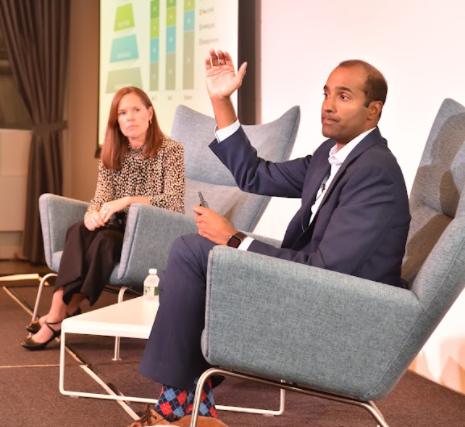

The younger generations of investors — also known as Gen XYZ — have a different expectation of their relationship with their wealth manager, and advisers that embrace digital communication, transparency and relatability will be the ones with a competitive edge.
That’s the upshot from a fireside chat with Anand Sekhar, vice president of practice management and consulting at Fidelity Investments, during the InvestmentNews Future of Our Business + 40 under 40 awards held Wednesday in New York City.
A confluence of industry trends — like the upcoming generational wealth transfer, the growing investor appetite for personalized experiences, and increased interest in environmental, social and governance investing — have led more Gen XYZ investors to start working with a new financial adviser compared with their baby boomer counterparts.
Between May 2020 and May 2021, 42% of advised Gen YZ investors and 28% of advised Gen X investors switched their primary advisers compared with just 1% of boomers, according to Fidelity’s annual Investor Insights Study.
There are three primary drivers that the study found for why investors are leaving their advisers, Sekhar said. The first is engagement frequency, which is more valued by Gen XYZ, particularly during the pandemic as investors want to be more hands-on with their investments and wealth building via digital channels.
“The hypothesis for why that is, I think, is that our industry has adapted in a positive way with the rise of the CFP and the rise of planning centric firms,” he said. “We have the opportunity as an industry to really present how you are engaging and what your engagement means.”
Advisers interested in capturing Gen XYZ clients also have to embrace fee transparency, Sekhar said. “Anytime we study how much clients should pay their adviser, it’s like a scatterplot and that’s horrible,” he said. “Prices are all over the map.”
This year has pushed advisers to embrace financial planning to help clients navigate volatility caused by COVID-19, and while more investors are engaged with planning, advisers also need to be very clear with the way they charge fees on those services.
Relatability also is a key component when catering to Gen XYZ investors. However, to be more relatable to diverse generations of investors, firms should employ diverse individuals who can share related experiences with different clients.
“Regardless of diversity, inclusion of heritage or history is relatable,” he said. “The experience of individuals that have walked in your shoes is so important to the client."
He added: "Our industry has a demand and our call to action around inclusion because our census data is showing that there's going to be wealth transferred and our country is more diverse than ever before.”
On top of that, there's an age demographic and gender disparity amongst advisers, Sekhar said. The average age of financial advisers is between 51-57 years old. The CFP Board estimates that 23% of certified financial planners are women.
“I once heard at a conference that the industry is called ‘stale, male and pale,’” he said. “When I heard that my heart was broken because that should not be our industry. The reality is that if our customers are changing, we have to change as well.”

Former Northwestern Mutual advisors join firm for independence.

Executives from LPL Financial, Cresset Partners hired for key roles.

Geopolitical tension has been managed well by the markets.

December cut is still a possiblity.

Canada, China among nations to react to president-elect's comments.
Streamline your outreach with Aidentified's AI-driven solutions
This season’s market volatility: Positioning for rate relief, income growth and the AI rebound
